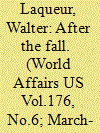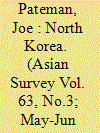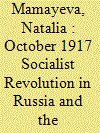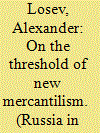|
|
|
Sort Order |
|
|
|
Items / Page
|
|
|
|
|
|
|
| Srl | Item |
| 1 |
ID:
128430


|
|
|
|
|
| Publication |
2014.
|
| Summary/Abstract |
As the Soviet Union disintegrated, ending on the ash heap of history in 1989-91, all the institutes for the study of Marxism-Leninism that had justified the regime, the collected and selected works of the communist classics, and the Marxism chairs in academies and universities also disappeared. From this void emerged a burning question: What was the raison d'être of the existing political system? And later, how did the new regime justify itself in the field of foreign and domestic affairs, and what was its social and economic policy? For the answers, Vladimir Putin and his followers went back to the future. Russia's official ideology prior to 1917 was Pravoslavie, Samoderzhavie,Narodnost, which has been translated as Orthodoxy, Autocracy, Nationality. This statement was made first by Sergei Uvarov, the Russian minister of education, in a circular letter in 1833. Uvarov was a learned man who also served as president of the Russian Academy of Sciences. No one had asked Uvarov to prepare such an official binding declaration. However, Czar Nicholas I liked this "triad," as it was called, even though its meaning was by no means always clear.
|
|
|
|
|
|
|
|
|
|
|
|
|
|
|
|
| 2 |
ID:
191597


|
|
|
|
|
| Summary/Abstract |
In communist discourse, revisionism denotes a modification of socialist theory and practice that undermines the revolutionary essence of socialism. This article examines the meaning and purpose of North Korea’s anti-revisionism. Each leader has emphasized different aspects of anti-revisionism, in accordance with the changing circumstances. Kim Il Sung made no concessions to revisionism. He endorsed Juche, the monolithic ideological system, and Korean-style socialism to oppose revisionism. Under Kim Jong Il’s leadership, economic cracks emerged in North Korea’s anti-revisionist edifice, though he promoted Songun politics to mitigate them. These economic cracks have widened under Kim Jong Un’s leadership, though he has promoted Kimilsungism-Kimjongilism to successfully maintain an anti-revisionist course. North Korea has upheld anti-revisionism to safeguard socialism and build communism. Anti-revisionism has played a central role in North Korea’s development by determining the evolution of its ideology, socialist system, and foreign policy. Today, North Korea is the last remaining bastion of anti-revisionism.
|
|
|
|
|
|
|
|
|
|
|
|
|
|
|
|
| 3 |
ID:
159321


|
|
|
|
|
| Summary/Abstract |
China experienced the strongest influence of Russia during the years of the October 1917 Revolution and the postrevolution period. An important role in China was played by the ideological and cultural impact of Russia on the New Culture Movement in the country (1915-1925), on whose basis the May Fourth Movement (1919) developed, and an upsurge of the revolutionary movement in China in 1925-1927. A study of the ideological and cultural aspects of the interaction and influence of Marxism-Leninism on China focuses on the common actions of the two sides on the spheres of ideology, culture, and democracy, and demonstrates the specific features of historical process in China.
|
|
|
|
|
|
|
|
|
|
|
|
|
|
|
|
| 4 |
ID:
151543


|
|
|
|
|
| Summary/Abstract |
The Soviet Union broke up twenty-five years ago, therefore it does not make much sense to explain in detail how much has changed since then in the public mind, in politics, and in the economy. Any anniversary is an occasion to look back in an attempt to find answers to questions such as: What trends have prevailed? What have we, Russians, lost and what have we gained? And what impact has the disappearance of the Soviet superpower had on the rest of the world?
|
|
|
|
|
|
|
|
|
|
|
|
|
|
|
|
|
|
|
|
|